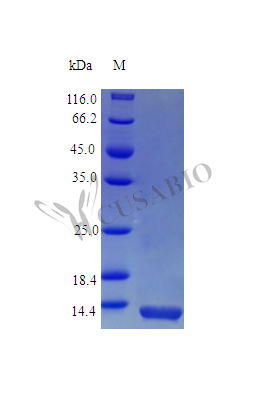The recombinant Rhesus Macaque IL13 is an active protein. It is produced in E. coli, involving co-cloning the target gene that encodes the 19-132aa of IL13 into an expression vector. This vector is introduced into E. coli cells, which are cultured under optimal conditions for protein expression. After cell lysis, the recombinant IL13 protein is purified using affinity chromatography. Protein purity is evaluated by SDS-PAGE, reaching over 98%. Its endotoxin content is less than 1.0 EU/μg as determined by the LAL method. Finally, the IL13 protein's activity is confirmed through a cell proliferation assay to ensure its functional integrity.
Rhesus Macaque IL13 plays a crucial role in immune responses, particularly in regulating type 2 immunity. IL13 is associated with Th2 skewed responses and is linked to eosinophil levels in the lungs of challenged animals. Studies have shown that IL13 levels in Rhesus macaques can influence the protective efficacy of vaccines, indicating its role in modulating immune reactions [1].
Furthermore, research has highlighted the presence of an IL13+GATA3+ Th2 subset in Rhesus macaques, which expresses eicosanoid pathway enzymes. This subset is accompanied by IL1RL1+GATA3+ regulatory T cells and a minor proportion of IgE+ plasma cells, demonstrating a tightly regulated type 2 immunity in these animals [2].
In cases of dermatological conditions like alopecia in Rhesus macaques, immune dysregulation marked by a shift towards a Th2 phenotype and changes in cytokine production, including IL13, have been noted. This immune dysregulation is akin to what is seen in human atopic dermatitis, emphasizing the relevance of IL13 in inflammatory responses and skin conditions in Rhesus macaques [3].
References:
[1] T. Morrison and E. Walsh, Subunit and virus-like particle vaccine approaches for respiratory syncytial virus,, p. 285-306, 2013. https://doi.org/10.1007/978-3-642-38919-1_14
[2] X. Dopico, Maintenance of caecal homeostasis by diverse adaptive immune cells in the rhesus macaque, Clinical & Translational Immunology, vol. 13, no. 5, 2024. https://doi.org/10.1002/cti2.1508
[3] J. Kramer, M. Fahey, R. Santos, A. Carville, L. Wachtman, & K. Mansfield, Alopecia in rhesus macaques correlates with immunophenotypic alterations in dermal inflammatory infiltrates consistent with hypersensitivity etiology, Journal of Medical Primatology, vol. 39, no. 2, p. 112-122, 2010. https://doi.org/10.1111/j.1600-0684.2010.00402.x






